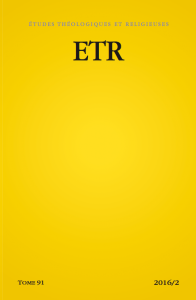La reconnaissance récente du judaïsme par le christianisme a eu pour conséquence le renoncement au supersessionisme. Cette nouvelle situation implique de repenser une théologie chrétienne du judaïsme. Serge Wüthrich expose ici la contribution du théologien luthérien Robert W. Jenson à cette entreprise. Le « non » du judaïsme au Christ est interprété par Jenson comme signifiant l’existence voulue par Dieu de deux communautés, l’Église et la synagogue, rendant possible la disponibilité au monde du corps du Christ ressuscité sur deux modes distincts. Dans cette perspective, l’Église, à l’instar du judaïsme rabbinique, doit se comprendre comme un détour au sein d’Israël dans l’attente de l’avènement final du Messie.
The recent recognition of Judaism by Christianity had as a consequence the renunciation of supersessionism (replacement theology). The new situation necessitates a rethinking of Christian theology concerning Judaism. The author sets out here the contribution of the Lutheran theologian Robert W. Jenson to the enterprise. Judaism’s “No” to Christ is interpreted by Jenson as signifying the coexistence of two communities, willed by God, the Church and the Synagogue, making it possible for the world to perceive the body of Christ resurrected in two distinct modes. In this perspective, the Church, following the example of rabbinic Judaism, must be understood as a detour within Israel, while the final coming of the Messiah is awaited.
p. 205-219
Auteur
WÜTHRICH Serge
Serge WÜTHRICH est docteur ès sciences de l'École polytechnique fédérale de Lausanne, docteur en théologie (Nouveau Testament) de l’Institut protestant de théologie, Faculté de Montpellier et pasteur de l’Église protestante unie de France.
